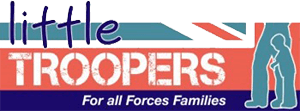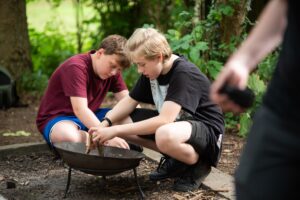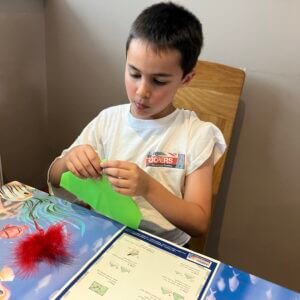Our latest meet the expert Q&A is with Matt Blyton, Senior Education Adviser for North Yorkshire County Council and a member of the Service Children in State School’s (SCISS) National Executive. Matt tells us why it’s important for all teachers to have a good understanding of the service lifestyle and how schools with any number of military children can plan to support service pupils during periods of challenge and change.
Tell us about yourself and how your role involves supporting service children?
I am a Senior Education Adviser for North Yorkshire County Council, so my main role is a quality assurance one in the field of school improvement. Throughout my 13 years with the Council, I have been a noisy advocate for service families and for many years was the Council’s named Service Children’s Lead, supporting schools in their work to provide the best possible education and welfare support for all children of military personnel. This has also involved running training, conferences and projects to develop and share good practice.
I have also been a member of the Service Children in State School’s (SCISS) National Executive throughout this time, a voluntary organisation which acts as the voice for schools that have Service children on their rolls. I also support the invaluable evidence-based work being done by the SCiP Alliance.
Do you have a connection to the military? If so, do you think this helps?
Not directly in terms of close relatives. However, I was the deputy headteacher of an RAF school ‘behind the wire’ in the late 1990s for 6 years and also spent 4 years in an advisory role working for Service Children’s Education (now called MOD Schools), supporting schools serving our military bases overseas. These roles have helped me gain a good understanding of both the many benefits that military communities bring to schools, but also of the considerable challenges service children, their families and their schools can face.
In your experience, what are the biggest challenges faced by service children in education?
I would say the biggest challenge is ‘not being understood’. For the large majority of service children, the ‘uniqueness’ of Service lifestyle – parental deployment, separation, regular school moves etc – is not an issue in itself and indeed should help develop a number of beneficial life skills. But all Service children will almost certainly benefit from some tailored support at times of change, and education professionals knowing when and how to provide that requires an understanding of Service lifestyle. This is even more the case when parents feel they cannot share challenges going on at home with school staff, and when service children’s classmates have no understanding of military life.
Many education professionals don’t have that good understanding. This is a particular problem for those Service children who attend schools where there are very few service children on roll – and that’s the majority of them!
Have these challenges changed during your career?
I’m not convinced that the challenges themselves have necessarily changed, although certain national policies and changes have probably made the detrimental impact of the challenges more acute. For example, take curriculum discontinuity; the increased demands of the National Curriculum, coupled with the autonomy schools have in how they deliver it, means that mobile service pupils now seem to miss areas of study, or duplicate them more than when I first started teaching.
I also feel that the additional challenges faced by service children with additional needs have got worse in recent years, largely due to the increase nationally of children with Education Health and Care Plans (EHCP) and the strain this has caused on wider services to support them – compounded but cuts to many of these services. Being mobile and having to start referral processes or re-join waiting lists for services such as CAHMs can be a real difficulty.
Why do you think it’s important for schools to offer targeted support for military children?
The evidence-base clearly shows a number of aspects of military life that can have a negative impact of service children’s educational progression and their emotional wellbeing. That is why in England the Government introduced the Service Pupil Premium, aimed primarily at supporting the pastoral needs of service children. Settled, happy children learn well, so often the tailored support is simply needed to smooth transitions between schools or provide some additional pastoral support during periods of parental separation and deployment.
When service children move between schools, especially between England and the devolved nations across the UK, they often need ‘gaps’ in learning plugging. Additional teaching support or tutoring can be very beneficial. This is particularly true for those older students moving during exam courses and having to change exam boards or even the subjects they are taking.
What initiatives or projects have you worked on that have been particularly effective?
I particularly remember a service pupils ‘Children’s Voice’ conference I ran in North Yorkshire a number of years ago, as this led to a number of improvements in provision and actions for schools, parents, the military and the Local Authority. It is crucial that schools always listen to the lived experiences and views of their Service children in their self-evaluation.
Recently, we have just completed a very successful school improvement project involving 24 schools and academies in the county called the Festival of Friends. This was funded through the Armed Forces Covenant Fund Trust. It involved upskilling staff, running school-based projects and then demonstrating the impact on students. It was supported by the FutureHY UniConnect, a programme from the Office for Students which offers activities, advice and information on the benefits and realities of going to university or college, in recognition that the proportion of service pupils moving into Higher Education is lower that is seen amongst civilian students.
Have schools in your region used Little Troopers resources before and have schools found the resources valuable?
Many access the great practical resources Little Troopers have developed over the years. We also had a number of schools that benefited in the charity’s virtual school roadshow last summer.
What advice would you offer to schools working with military children?
First and foremost, ensure that your staff are well trained in understanding the challenges of military life. Then ensure that your service children are recognised for their often very different lifestyles amongst the whole school community. Most importantly, I would encourage all schools that have Service children on their rolls, no matter how few, to use the Thriving Lives toolkit from the SCiP Alliance: underpinned by rigorous research and thoroughly tested in schools, the Toolkit provides schools with a framework of 7 principles through which to reflect on their practice and a 3 tier set of CPD resources.
What’s the one thing you think is most important for schools to do for forces children?
Have robust plans and procedures in place for pupil mobility, which includes a relentless focus on getting educational records from any transferring schools when these are not forthcoming or slow to arrive – be like the dog with a bone! Poor transitions cause lost learning and emotional stress, and we all owe it to our military communities to mitigate this.






